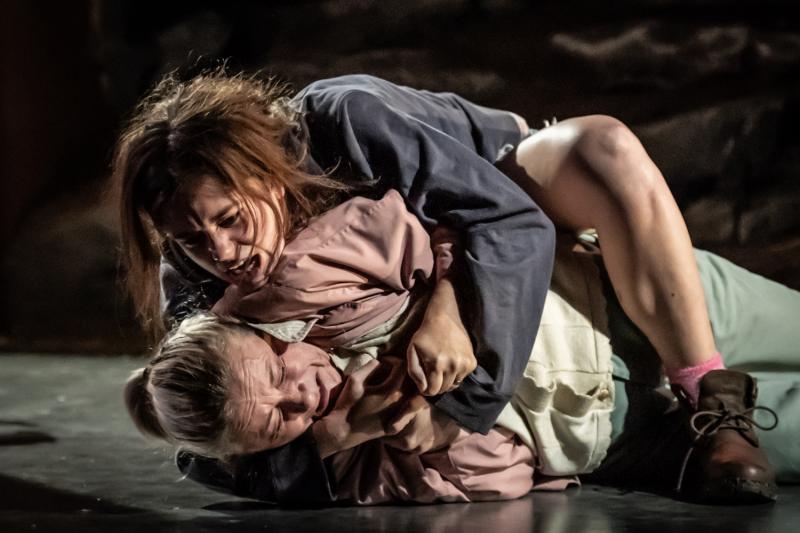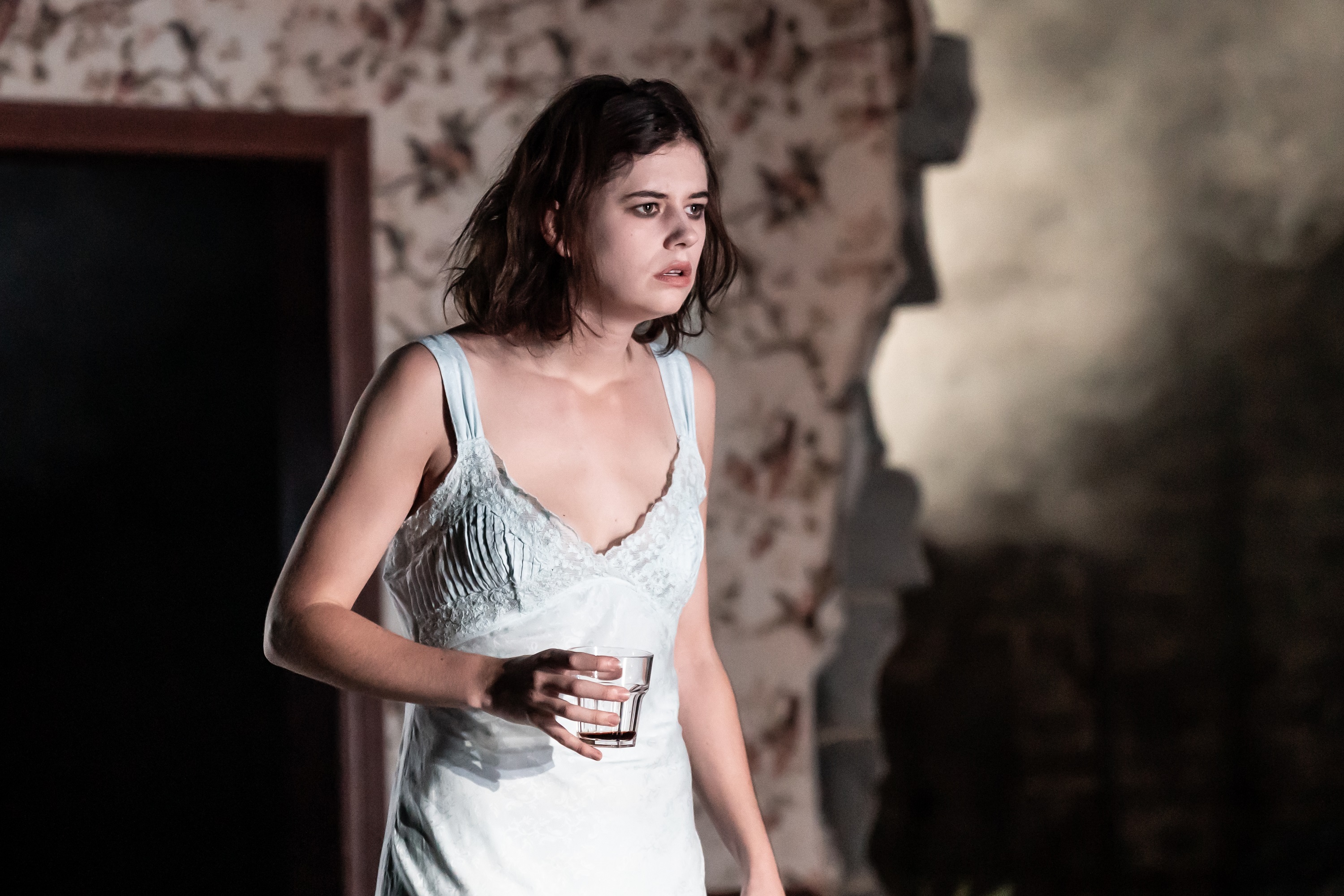Portia Coughlan, Almeida Theatre review - atmospheric revival of Marina Carr's bleak 1996 drama | reviews, news & interviews
Portia Coughlan, Almeida Theatre review - atmospheric revival of Marina Carr's bleak 1996 drama
Portia Coughlan, Almeida Theatre review - atmospheric revival of Marina Carr's bleak 1996 drama
Haunted by the ghost of her brother, Alison Oliver's depressed Portia is on a path to self-destruction

In 1994, the National Maternity Hospital in Dublin commissioned Marina Carr to write a play to celebrate its centenary. She walked the wards, met the new mothers, and wrote in a hospital study.
Who knows what the commissioners were expecting, maybe something more upbeat, but what they got was a harrowing portrait of a young mother in the grip of depression. It came to the Royal Court in 1996 when Irish playwrights were all the rage. Nowadays, it’s the Irish novelists and not the playwrights that make the headlines.
The main character is called Portia and she lives in Belmont, but that’s where the comparison with Shakespeare’s play ends. Here, Belmont is in the Irish Midlands not Italy. Shakespeare’s Portia had a father who believed that surface glitter was unimportant. Carr’s Portia is pushed by her father into a marriage with the richest man in the county, rather than encouraging her to go to college. The play has more in common with a Greek tragedy than a Shakespearean comedy.
Portia, played by Alison Oliver (pictured below), is sozzled by 10am on her 30th birthday. She’s almost comatose, stretched out on the sofa in her comfortable living room. In Alex Eales’s design, the back wall has been punched open, and through the gaping hole one can see the banks of the Belmont river, a place that is never far from Portia’s mind. It was there that her twin brother, Gabriel, committed suicide just after their fifteenth birthday. The intensity of their relationship was such that her mother says in her thick Midlands accent: "Chem ouha tha womb clutchin’ yar leg an’ he’s still clutchin’ ud from wherever he is." Whenever Portia is on her own, the ghost of her brother (Archee Aitch Wylie) appears to her. He sings Maimuna Memon’s haunting songs, specially written for this production, the beauty of which provide some relief from the bleak events that occur.
Portia’s hunched misery sees her lash out at her family who stream in to wish her happy birthday. Incongruously dressed in denim shorts, she constantly strokes her neck as if someone or something is strangling her. The climax of a grim two days occurs at the end of Act One. Then the play rewinds in Act Two, as an improbable number of skeletons tumble out of the cupboard, jostling for fresh air, and her state of mind becomes more and more explicable. Portia is not a likeable character - Carr’s text suggests that she is crueller than Oliver makes her - but you gradually feel the weight of her sorrows as she struggles and fails to defeat what she feels is her inevitable fate.
It is not just her relationship with Gabriel and her lingering guilt. They, of course, weren’t identical twins, but she still feels as if she has lost a limb, living in limbo, somewhere between life and death. There’s also the stifling community in which she lives. She loves and understands the landscape, but not the people. Her family expect her to behave like a dutiful housewife and mother, but she feels alienated from her sons. In her nightmares, she imagines killing them like an Irish Medea. Her father mourns the loss of a son to take over the farm. Then there’s the ogling nature of the men she grew up with, who refuse to accept that she has "allas found sex ta be a greah leh down". She tells the local barman, who fancies his chances, that "you’re the kinda cowbiy as gets shoh i’that first scene of a bad western."
 It’s the women who stand out. Kathy Kiera Clarke’s warm Maggie May Dorley, Portia’s aunt and a retired sex worker, who is married to the devoted, fussy Senchil (Fergal McElherron). Marianne Scully, Portia’s anxious mother, played by Mairead McKinley, who is lacerated by Portia both verbally and physically. She’s so appalled by the state of Portia’s house that she immediately starts mopping the filthy floor. We learn that early on in her marriage, she was sent to her room with her two children every evening by her husband’s mother, Blaize Scully. It’s as if there is a genetic streak of misery in the family.
It’s the women who stand out. Kathy Kiera Clarke’s warm Maggie May Dorley, Portia’s aunt and a retired sex worker, who is married to the devoted, fussy Senchil (Fergal McElherron). Marianne Scully, Portia’s anxious mother, played by Mairead McKinley, who is lacerated by Portia both verbally and physically. She’s so appalled by the state of Portia’s house that she immediately starts mopping the filthy floor. We learn that early on in her marriage, she was sent to her room with her two children every evening by her husband’s mother, Blaize Scully. It’s as if there is a genetic streak of misery in the family.
Carrie Cracknell’s atmospheric production is dark and subdued, literally dark given Guy Hoare’s sombre lighting. There is, I think, more black humour in Carr’s play than Cracknell uncovers. The evening springs to life when Sorcha Cusack’s Grandmother rolls on in her wheelchair and spits venom in all directions. She maybe evil, but there’s a vitality when she’s onstage, which is all too often missing elsewhere.
- Portia Coughlan at the Almeida Theatre until 18 November 2023
- More theatre reviews on theartsdesk
The future of Arts Journalism
You can stop theartsdesk.com closing!
We urgently need financing to survive. Our fundraising drive has thus far raised £49,000 but we need to reach £100,000 or we will be forced to close. Please contribute here: https://gofund.me/c3f6033d
And if you can forward this information to anyone who might assist, we’d be grateful.

Subscribe to theartsdesk.com
Thank you for continuing to read our work on theartsdesk.com. For unlimited access to every article in its entirety, including our archive of more than 15,000 pieces, we're asking for £5 per month or £40 per year. We feel it's a very good deal, and hope you do too.
To take a subscription now simply click here.
And if you're looking for that extra gift for a friend or family member, why not treat them to a theartsdesk.com gift subscription?
more Theatre
 Works and Days, Edinburgh International Festival 2025 review - jaw-dropping theatrical ambition
Nothing less than the history of human civilisation is the theme of FC Bergman's visually stunning show
Works and Days, Edinburgh International Festival 2025 review - jaw-dropping theatrical ambition
Nothing less than the history of human civilisation is the theme of FC Bergman's visually stunning show
 Every Brilliant Thing, @sohoplace review - return of the comedy about suicide that lifts the spirits
Lenny Henry is the ideal ringmaster for this exercise in audience participation
Every Brilliant Thing, @sohoplace review - return of the comedy about suicide that lifts the spirits
Lenny Henry is the ideal ringmaster for this exercise in audience participation
 Edinburgh Fringe 2025 reviews: The Beautiful Future is Coming / She's Behind You
A deft, epoch-straddling climate six-hander and a celebration (and take-down) of the pantomime dame at the Traverse Theatre
Edinburgh Fringe 2025 reviews: The Beautiful Future is Coming / She's Behind You
A deft, epoch-straddling climate six-hander and a celebration (and take-down) of the pantomime dame at the Traverse Theatre
 Good Night, Oscar, Barbican review - sad story of a Hollywood great's meltdown, with a dazzling turn by Sean Hayes
Oscar Levant is an ideal subject to refresh the debate about media freedom
Good Night, Oscar, Barbican review - sad story of a Hollywood great's meltdown, with a dazzling turn by Sean Hayes
Oscar Levant is an ideal subject to refresh the debate about media freedom
 Edinburgh Fringe 2025 reviews - Monstering the Rocketman by Henry Naylor / Alex Berr
Tabloid excess in the 1980s; gallows humour in reflections on life and death
Edinburgh Fringe 2025 reviews - Monstering the Rocketman by Henry Naylor / Alex Berr
Tabloid excess in the 1980s; gallows humour in reflections on life and death
 Edinburgh Fringe 2025 reviews: Lost Lear / Consumed
Twists in the tail bring revelations in two fine shows at the Traverse Theatre
Edinburgh Fringe 2025 reviews: Lost Lear / Consumed
Twists in the tail bring revelations in two fine shows at the Traverse Theatre
 Make It Happen, Edinburgh International Festival 2025 review - tutting at naughtiness
James Graham's dazzling comedy-drama on the rise and fall of RBS fails to snarl
Make It Happen, Edinburgh International Festival 2025 review - tutting at naughtiness
James Graham's dazzling comedy-drama on the rise and fall of RBS fails to snarl
 Edinburgh Fringe 2025 reviews: I'm Ready To Talk Now / RIFT
An intimate one-to-one encounter and an examination of brotherly love at the Traverse Theatre
Edinburgh Fringe 2025 reviews: I'm Ready To Talk Now / RIFT
An intimate one-to-one encounter and an examination of brotherly love at the Traverse Theatre
 Top Hat, Chichester Festival Theatre review - top spectacle but book tails off
Glitz and glamour in revived dance show based on Fred and Ginger's movie
Top Hat, Chichester Festival Theatre review - top spectacle but book tails off
Glitz and glamour in revived dance show based on Fred and Ginger's movie
 Edinburgh Fringe 2025 reviews: Alright Sunshine / K Mak at the Planetarium / PAINKILLERS
Three early Fringe theatre shows offer blissed-out beats, identity questions and powerful drama
Edinburgh Fringe 2025 reviews: Alright Sunshine / K Mak at the Planetarium / PAINKILLERS
Three early Fringe theatre shows offer blissed-out beats, identity questions and powerful drama
 The Daughter of Time, Charing Cross Theatre review - unfocused version of novel that cleared Richard III
The writer did impressive research but shouldn't have fleshed out Josephine Tey’s story
The Daughter of Time, Charing Cross Theatre review - unfocused version of novel that cleared Richard III
The writer did impressive research but shouldn't have fleshed out Josephine Tey’s story
 Evita, London Palladium review - even more thrilling the second time round
Andrew Lloyd Webber's best musical gets a brave, biting makeover for the modern age
Evita, London Palladium review - even more thrilling the second time round
Andrew Lloyd Webber's best musical gets a brave, biting makeover for the modern age

Add comment